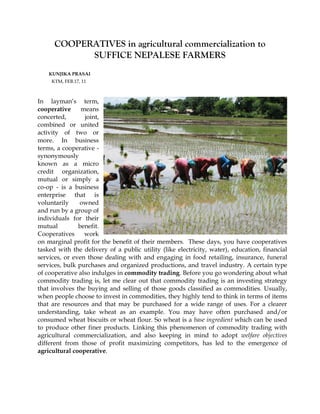
COOPERATIVES in agricultural commercialization to SUFFICE NEPALESE FARMERS
- 1. COOPERATIVES in agricultural commercialization to SUFFICE NEPALESE FARMERS KUNJIKA PRASAI KTM, FEB.17, 11 In layman’s term, cooperative means concerted, joint, combined or united activity of two or more. In business terms, a cooperative - synonymously known as a micro credit organization, mutual or simply a co-op - is a business enterprise that is voluntarily owned and run by a group of individuals for their mutual benefit. Cooperatives work on marginal profit for the benefit of their members. These days, you have cooperatives tasked with the delivery of a public utility (like electricity, water), education, financial services, or even those dealing with and engaging in food retailing, insurance, funeral services, bulk purchases and organized productions, and travel industry. A certain type of cooperative also indulges in commodity trading. Before you go wondering about what commodity trading is, let me clear out that commodity trading is an investing strategy that involves the buying and selling of those goods classified as commodities. Usually, when people choose to invest in commodities, they highly tend to think in terms of items that are resources and that may be purchased for a wide range of uses. For a clearer understanding, take wheat as an example. You may have often purchased and/or consumed wheat biscuits or wheat flour. So wheat is a base ingredient which can be used to produce other finer products. Linking this phenomenon of commodity trading with agricultural commercialization, and also keeping in mind to adopt welfare objectives different from those of profit maximizing competitors, has led to the emergence of agricultural cooperative.
- 2. Agricultural Cooperative Agricultural cooperatives are those cooperatives where farmers gather their resources for mutual benefit. They are also referred to as farmers’ cooperatives. Broadly, you have two types of farmers’ cooperatives – agricultural service cooperatives and agricultural production cooperatives. The first one provides various services to individual farming members, while the latter pools production resources such as land or machinery for members to farm jointly. Merits of farmer cooperatives If cooperatives are to engage in agricultural commercialization, it could prove to be really advantageous for Nepalese farmers, and the country as a whole. I can give you a list of the good it could bring to our economy as follows: Farmers’ cooperatives are more locally oriented than are large companies. Farmers can get better and fair price for their produce, there by increasing their quality of life. Farmers can be empowered and their competitiveness can be increased globally Economic growth can be stimulated. Agricultural production can be increased. You can also undertake future trading in commodities of which the cooperatives are having the stock, so that if the market goes unfavorable, physical delivery can be arranged. Since physical delivery can be promptly arranged, it can reduce price risks and market risks. In essence, you also have the opportunity to experience stabilized prices of agricultural commodities. Overall, farmers’ cooperatives can preserve interest of producers and add value to agricultural commodities. It can enhance food sufficiency and agricultural sustainability, side by side promoting Nepal’s socio economic development. Past Initiatives It’s not that past initiatives have not been made. But past movement, however, have not brought about much impact on agricultural commercialization, socio-economic transformation of the nation and self-sufficiency of farmers. What appear to be the major factors responsible for the failure of the cooperative movement in Nepal include: Lack of full governmental support Lack of clear mission and vision Lack of appropriate planning, implementation and evaluation Lack of research
- 3. Lack of technology/agro-machines Lack of sound policies, programs, rules and regulations Lack of an efficient communication system Lack of sufficient credit availability Lack of sufficient resources Need of Farmers’ Cooperative Provided that these factors that may stand as an obstacle are taken into account, involving cooperatives in agricultural commercialization in an organized and systematic manner would highly benefit the economy. Besides, our economy is so very dependent on agriculture from the inception to date. A consistent and continuous effort needs to be undertaken to best exploit and utilize the window of opportunity at hand. A single blow doesn’t break a door. It creaks at the first, cracks at the second and finally shivers at the third. So what if the cooperative movement failed at the first try? Farmer’s cooperative is vital to suffice the nation and its farmers the development they require. It is high time that cooperatives in Nepal get involved in agricultural commercialization and set out once again for a cooperative movement. Because when your sword breaks during a battle, you draw your dagger.